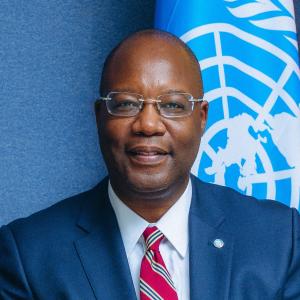Protocols:
Your Excellency the President of Uganda,
Honourable Ministers,
Honourable Members of Parliament,
Representatives from the Ministry of Health,
Representatives from the Uganda AIDS Commission,
District Delegates
My fellow AIDS Development Partners,
Implementing Partners,
Members of civil society and the private sector,
People Living with HIV,
Media Fraternity,
Distinguished Guests,
Ladies and Gentlemen,
All protocols observed,
Appreciation
Your Excellency, distinguished colleagues, the leadership and communities of Buyende District, thank you for hosting us for the commemoration of the 36th World AIDS Day. It is a pleasure to be in Busoga Kingdom today for this event and to experience your hospitality, firsthand.
I am Leonard Zulu, the new United Nations Resident Coordinator to Uganda (the Pearl of Africa). I am one month old in this beautiful country. I am grateful for the warm welcome that I have received from the Ugandan Government and people and look forward to advancing our joint development and humanitarian efforts in the coming years.
Today, we are here to celebrate the tremendous progress in the HIV response and to acknowledge the work that is ahead of us towards achieving the 2030 target of ending AIDs as a public health threat in Uganda. I would like to take this opportunity to thank you your Excellency for the leadership in the HIV response, as acknowledged not only here in Uganda but globally. The World has learned many things from Uganda and these lessons are being applied in many countries as they grapple their own HIV epidemics.
Allow me to also acknowledge that controlling HIV is central to achieving several SDG targets. If we achieve the targets on HIV we will have a positive rippling impact on other SDGs and so for us this work continues to be very important.
I acknowledge the positive outcomes of your work in this Country under the leadership of the Uganda AIDS Commission.
Globally, AIDS-related deaths have declined by almost 70% since the peak in 2004 and new infections have reduced by almost 60% since the peak in 1995.
This is evidence of the progress that the world has made. However, it is important that we guard against the complacency that has set in and that threatens to erode all these gains.
Today, we all want to live in a world of inclusive and healthy societies,
But our world is struggling with growing inequalities and intolerance for diversity. As Nelson Mandela said, it always seems impossible until it is done.
The AIDS movement—in all its diversity—knows this,
We have defied our critics over and over,
We have shown compassion for the most vulnerable among us,
We have embraced innovation,
As a result, many countries have made huge gains so, let us not be distracted from our urgency. Because we all know that our work is not done. AIDS is not over.
Key Data points
- Uganda still registers 730 new HIV infections per week which accounts to 38,000 new HIV infections annually, “we must close the gap on new Infections”
- Percentage of women and men who experience physical gender-based violence from intimate partners in Uganda is still unbearable high at 45% and that for sexual gender-based violence is 36%, way above the national targets of 11% and 8%.
- AIDS related deaths stand at 20,000 death per year as of 2024,
- By December 2023, about 92% of People living with HIV knew their HIV status but only 83% were on treatment and only 79% of PLHIV suppressed their viral load.
That is why today I want to reiterate that taking the rights Path to End AIDS by 2030 is the only way to go.
A new UNAIDS report released on 26th of November 2024 ahead of World AIDS Day, establishes that ending inequalities is the pathway to an HIV response that is robust and sustainable. The gaps in the realization of human rights for all are keeping the world from getting on the path that ends AIDS and this is threatening to undermine the progress that has been made.
So how do we protect the gains already made against HIV and make further progress towards that vital 2030 goal?
- We must uphold the rights of women and girls,
- Prevent gender-based violence that increases vulnerability to HIV.
- Make life skills information and education and information accessible for the adolescents and young people
- There is an urgent need to invest in girls’ and boys’ education at least up to a lower secondary school level and to provide life skills/ sexuality education—as a critical component of HIV prevention and gender-based violence.
Stigma and discrimination against people living with HIV and minority communities remains a significant barrier to end AIDS by 2030, Taking the Rights Path, shows that upholding rights is the pathway to an HIV response that is robust and sustainable.
As I conclude, I convey to you a message from the UN Secretary-General António Guterres:
“This year’s World AIDS Day reminds us the fight against AIDS can be won if leaders take a rights-based approach to ensure that everyone — especially the most vulnerable — can get the services they need without fear.
The inspirational advances made in the global HIV response have been powered by global solidarity and human rights.
We will overcome AIDS if the rights of everyone, everywhere, are protected.
I call on all leaders to heed this year’s theme and take the “rights” path.”
Thank you all for listening to me





